Story of strengthening the organizational foundation of NPO CORE

The NPO CORE’s Road Repair With Do-nou (Sandbag) Gaining Support and Has Been Expanded to Asia, Latin America, and Oceania
CORE, a non-profit organization, is repairing roads with sandbags in Africa and other developing countries under the concept of “repairing our own roads by ourselves.” We asked Mr. Makoto Kimura, the Chairman of the Board, how CORE, which was virtually unknown in Japan, raised awareness of the organization and developed its activities through efforts to strengthen its public relations infrastructure.
[This is a re-edited version of an article originally published in No. 291 edition, THE BIG ISSUE JAPAN (July 15, 2016).]
One-Tenth of the Cost of Paving
Making People Happy With Simple Technology
In rural villages in developing countries, most of the roads used in daily life are not paved. As a result, when it rains, sections of the road become muddy and impassable, with large holes everywhere. Many people may recall the scene of several men pushing a car stuck in the mud to escape.
However, surprisingly few people see this as a poverty issue, such as the inability to transport crops from the fields to market, which closes off possibilities of cash income, or the inability to transport sick people to the town clinic.
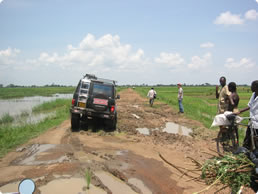
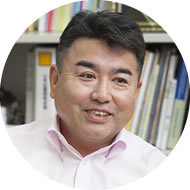
NPO CORE
Mr. Makoto Kimura
Mr. Makoto Kimura, a civil engineering specialist and longtime instructor at a Kenyan university in international cooperation, is one of those who has seen people looking up to the heavens helplessly in front of muddy roads. Mr. Kimura wondered what he could do as a civil engineer to help reduce poverty in Africa. After much deliberation, Mr. Kimura decided on “road repair with sandbags.” What inspired him was his mentor’s words, “a real researcher should be able to make people happy not only with difficult things but also with simple techniques.”
“It is simple to use heavy equipment, but in a country where money is scarce, technology must enable residents to repair roads on their own, or the system will fail. Sandbags have a high load-bearing capacity simply by filling the bag with soil or gravel and tightening it, so if you dig up an uneven farm road surface, line it with sandbags, and hit it with a mallet or thick branch, it will look like a new road.”
Each sandbag costs about 25 yen. Locally sourced soil and stones are used. Because the work is done by local residents using human labor, the cost of repairing one meter of road is approximately 500 yen, which is less than one-tenth of the cost of concrete pavement.
In 2005, Mr. Kimura first put it into practice in Papua New Guinea and later promoted projects in Kenya and other countries before launching the “NPO CORE” in 2007. At first, the villagers in the area gather in disbelief, but once the work begins, the color of their eyes changes. When the muddy paths are cleared, there is joyful chatter and laughter, as well as shouts of delight at having made the paths on their own.
“In Japan, there has long been a tradition of ‘road repair,’ in which residents work together to repair the roads they use for daily life. It is a spirit of mutual reliance in which we do not rely on the assistance of others but rather fix our own roads. We believe that spreading such awareness to many developing countries, as well as instilling confidence and motivation, is an important mission for us.”
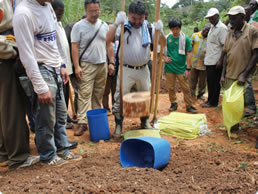
First Debriefing of Activities in Japan
Develop a Sense of Being a Non-profit Organization
“CORE” was established in response to residents’ enthusiasm for the idea of being able to repair roads on their own using simple sandbagging techniques.
However, the organization was not well known at first and was virtually unknown in Japan. The project’s budget was only a few million yen per year, and it was a half-volunteer effort led by Mr. Kimura and students in his laboratory. In order to expand this program of road repair by the residents to the rest of the world, it was needed to secure the support of a larger number of people. We applied for the “Panasonic NPO/NGO Support Fund for Africa” program, which supports “NPOs/NGOs operating in African countries” to strengthen their public relations infrastructure. The grant was awarded for three years starting in 2011 to help strengthen the organization’s public relations infrastructure.
During the first year of the grant, the organization’s mission was to instill confidence and self-reliance in local communities, allowing them to forge their own paths while also bringing people closer to Africa. In addition to creating a booklet aimed at the Japanese general public, the first “activity debriefing” was held in Kyoto, Japan. The program’s agenda includes face-to-face meetings with the general public in Japan to report on the program’s operations. Mr. Kimura stated that while preparing for his first debriefing session, he became more aware of his role as an NPO.
“Previously, we had quite often presented information about ‘our activities’ from the perspective of those who were actually carrying them out, but then we began to consider what information we should gather and how we should present it in an easy-to-understand manner so that the general public and businesses could understand and sympathize with our activities. I learned a lot from the visual displays, the exhibition concepts, and even how to create the atmosphere of the venue. Above all, through this work, I have shed the naivety that I had somewhere in my mind that ‘I am a volunteer, so I can work at......,’ and have become aware of the need to work as an organization with a sense of management.”
As a result, Mr. Kimura hired the current Director, who was a graduate student at the time, as a full-time staff member. “We will make sure that the organization is capable of paying proper salaries.” “Creating local jobs is the real BOP support (*). You can do research while doing support activities.” This is how Mr. Kimura convinced him to join. The CORE’s secretariat was also established. From the second year on, the group produced videos with the actual voices of the participants showing how the sandbags were used to repair the road, as well as “a pamphlet with a pop-up picture” of a person pounding the sandbags. Simultaneously, the organization held debriefing sessions and other events in both Japan and Kenya, using a combination of pamphlets and live demonstrations. Its unique publicity activities became a topic of conversation, resulting in increased donations and membership in Japan. It also drew the attention of the Japanese ambassador to Kenya, resulting in the expansion of activities there.
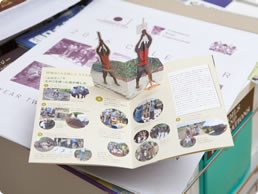
The Scale of Business Is 40 Times Larger, and There Are 25 Countries of Operation
Aiming to Be the World’s Best International Civil Engineering NPO
“We asked about 100 children in a Kenyan village whose lives had been improved by road repair to draw pictures on sandbags about their dreams and future. We interviewed approximately 100 locals about their thoughts on the road and discovered many genuine success stories.” With improved public relations materials and the hiring of full-time staff, we were able to give shape to our ideas, which resulted in the Ministry of Foreign Affairs awarding us the Grant Assistance for Japanese NGO Projects in Kenya, which provided us with additional opportunities to significantly expand our operations in the coming years.”
Currently, the scale of the “CORE” project is about 40 times larger than it was before the grant. The number of paid Japanese employees has increased to five, with a total of 33 if overseas local staff is included. The number of countries implementing the project has grown from 5 to 25, and its activities have spread to Asia, Latin America, and the Pacific, in addition to Africa, with Kenya serving as the focal point.
In Kenya, a number of entrepreneurs who undertake road construction have emerged from among local youths who have learned the sandbag method, and the efforts of “CORE” were also mentioned in Prime Minister Abe’s Africa policy speech in Ethiopia in January 2014.
“At its core, civil engineering serves to protect and enrich people’s lives. While reflecting on its origins, which are often forgotten in Japan, we hope to become the world’s number one international civil engineering NPO in the future.”
* BOP support: A project that aims to solve social problems caused by poverty while also turning them into a business opportunity for low-income groups.
[Organization Profile]
NPO CORE
Mr. Kimura devised a method for “repairing roads with sandbags” in order to alleviate poverty in Africa. Since its inception as an NPO in 2007, CORE has worked in 25 countries, mostly in Africa, to help people repair their own roads. This is based on the idea of “repairing our own roads ourselves.”
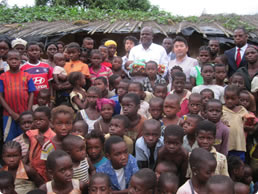
Home page

